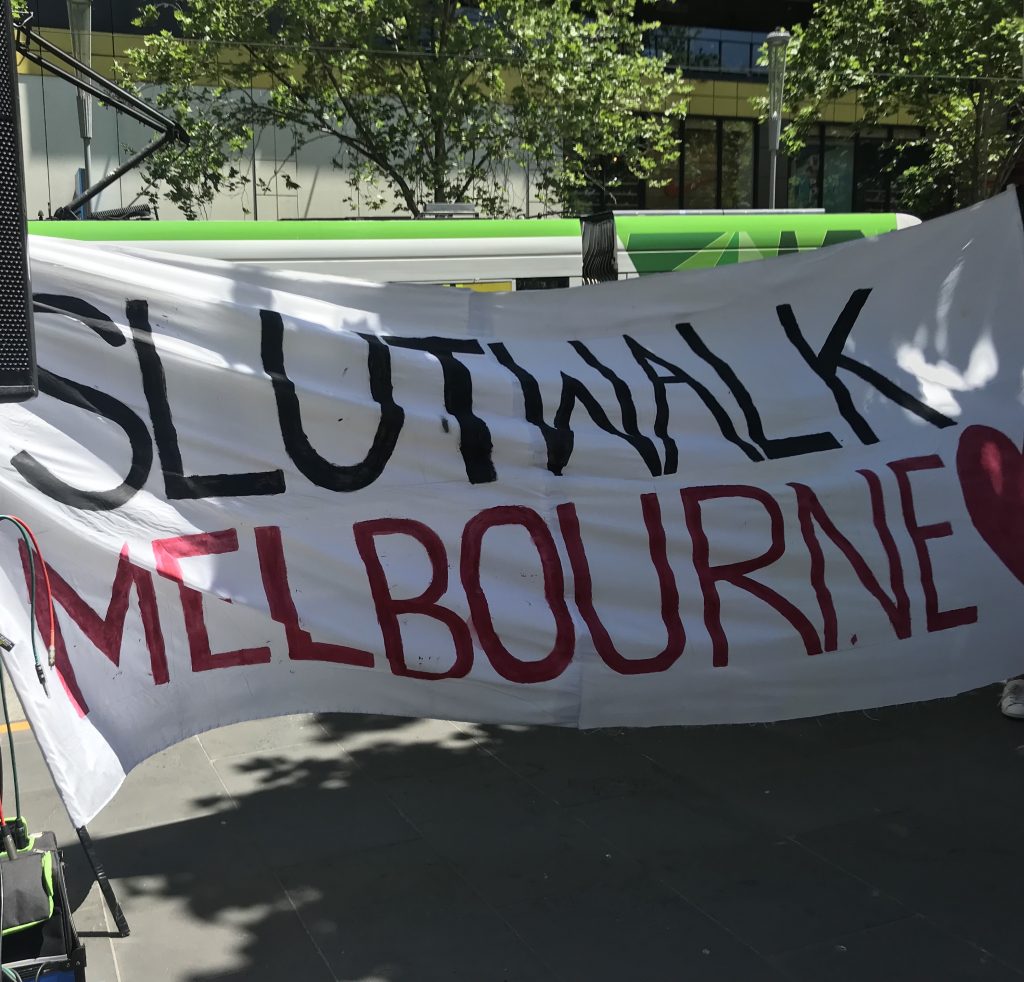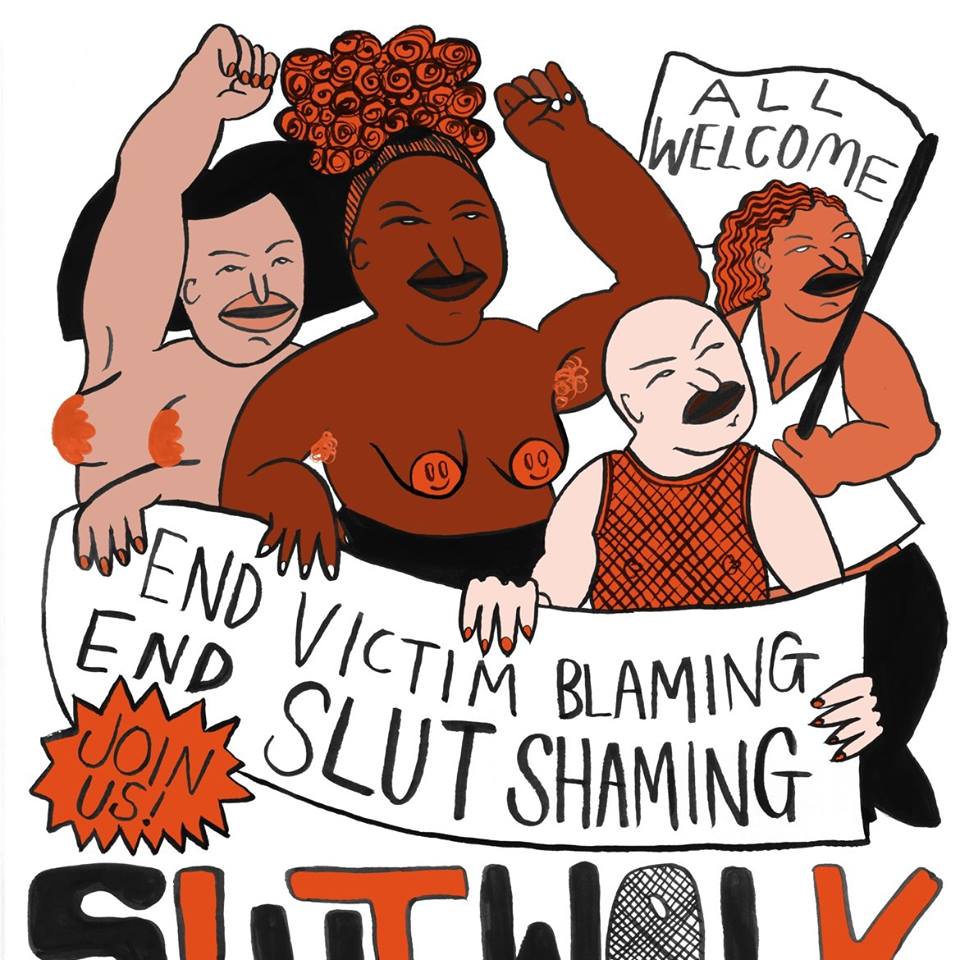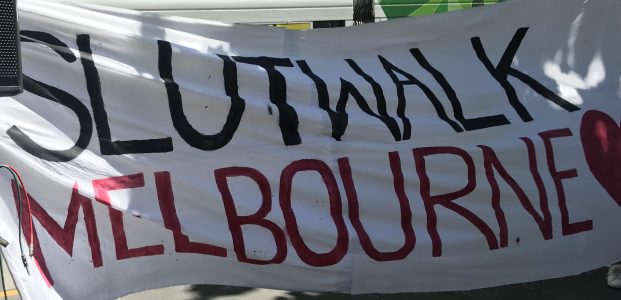As we ring in the new year, the Empowered Together team has taken the time to reflect on some of the events we attended in 2018. One that stands out is SlutWalk, an event which ran in November to protest against victim blaming and the myth that a person’s clothing in any way contributes to sexual violence. The event came just days after a seventeen-year old survivor’s lacy thong underwear was presented as evidence in an Ireland sexual assault case. The man accused of her sexual assault was acquitted, leading to global outrage and demonstrating that SlutWalk was just as important as ever.
The event in Melbourne drew thousands and included a diverse group of tireless advocates as well as people who were there to learn about the cause. Our team joined the march through the city and shares some of their thoughts here.

Why is Slutwalk something you support?
Katie (Chief Schools Officer):
Slutwalk for me is about bringing into the spotlight the fact that victim-blaming and slut-shaming still exist. People wearing whatever they like is an issue I feel very strongly about, particularly in terms of non-binary individuals, but blaming the victim of an assault on what they were wearing is just another facet of how society weaponises clothing to keep quiet the people who are already feeling marginalised. I support people owning their own bodies and dressing them how they like, and I want all members of society to be aware that slut-shaming and victim-blaming still exist and they’re not okay.
Rena (Co-founder):
It’s hard to believe this is something we still need to rally and protest. But SlutWalk will remain important until a survivor’s clothing is no longer used as part of a criminal trial, reported on in media reports of their assault or is believed by anyone to “invite” sex. If people attend today or see the march and wonder what it’s all about, it may challenge their own perceptions or encourage them to start discussion in their own circles. Ultimately, I support SlutWalk because I hope one day, everyone can wear whatever they want without any insinuation of consent.
Friend of Empowered Together:
I support Slutwalk because I think we need cultural change to stop victim blaming and to promote community accountability.
Friend of Empowered Together
I support the two core tenets of people being able to wear what they want and obviously victim blaming is bad. Victim blaming is ridiculous, it shouldn’t even be a thing that needs to be stated. It should go without saying that people should obviously control consent about having their bodies touched. It shouldn’t matter what you wear.
Was the day what you expected?
Katie (Chief Schools Officer):
It was more or less what I expected, but I think there were less people in the march than in previous years or than what I expected. As I was marshalling, I interacted a lot more with opponents of the march and also with the police, which was a bit heavy and not what I expected. In previous years I haven’t really seen anyone opposing the march or maybe just didn’t notice. From what I could see most of the people opposing the march were just bored young men who didn’t really get it and just wanted to rile up a bunch of angry feminists for a bit of fun on a Saturday. The police were helpful in moving them on though.
Rena (Co-founder):
I was surprised, although I probably shouldn’t have been, to see people opposing the march. But at the same time, it was so great to see people new to the cause who were attending their first rally or protest of this kind. The MeToo movement seems have brought this topic to the forefront of everyone’s mind and so it was good to see some new (friendly) faces.
Friend of Empowered Together:
The day was what I expected, but I was really inspired by survivors who shared their stories and the atmosphere of support and inclusivity on the day.
Friend of Empowered Together:
Yes pretty much. There was a lot more people on the street observing than I expected and a lot more pushback from people about something that seems pretty straightforward.
Having an opposition to the idea of not being blamed for what you wear seems bizarre.

What can people do to do their part for addressing victim blaming?
Rena (Co-founder):
It’s a tough question because victim blaming is the result of deep rooted problems in society such as gender inequality and power imbalance. Nonetheless, I believe there are things we can all do. For example, calling out examples of victim blaming is really important. This can be in the media, in comments from your friends or even in yourself.
Katie (Chief Schools Officer):
I think cultural change like this can only happen when people change themselves and those in their lives. Being aware of this issue can be the beginning of analysing attitudes and practices you might have and changing your behaviours accordingly, and hopefully helping others to shift their behaviours also. For example, if you see someone in public who is showing more skin than you would be comfortable showing, try asking yourself what judgements you might have made about that person and why. Then try thinking about all the other things they might have their lives; their skills, family, ambitions, jobs, beliefs, friends, memories. I think if you spend a minute each day, just quietly in your own head, remembering to humanise someone who you might otherwise have dismissed as different or even a ‘slut’, then your responses to situations like allegations of assault will change with your attitude. Others will see your responses, and they might also begin to think differently. Change is slow and can be very subtle, but it’s necessary while we still live in a world where a rape victim is forced to have her underwear held up in a courtroom.
Addressing victim blaming is a key part of Empowered Together’s vision to see a world without sexual assault. We thank the organisers of SlutWalk for their work in putting together the event and look forward to attending again next year.

